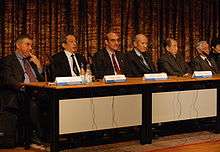Toshihide Maskawa
| 益川 敏英 Toshihide Maskawa | |
|---|---|
 Maskawa in 2008 | |
| Born |
February 7, 1940 Nagoya, Japan |
| Residence | Japan |
| Nationality | Japan |
| Alma mater | Nagoya University |
| Known for |
Work on CP violation CKM matrix |
| Awards |
Sakurai Prize (1985) Japan Academy Prize (1985) Asahi Prize (1994) Nobel Prize in Physics (2008) |
| Scientific career | |
| Fields | High energy physics (theory) |
| Institutions |
Nagoya University Kyoto University Kyoto Sangyo University |
| Doctoral advisor | Shoichi Sakata |
Toshihide Maskawa (or Masukawa) (益川 敏英 Masukawa Toshihide, born February 7, 1940 in Nagoya, Japan) is a Japanese theoretical physicist known for his work on CP-violation who was awarded one quarter of the 2008 Nobel Prize in Physics "for the discovery of the origin of the broken symmetry which predicts the existence of at least three families of quarks in nature."[1]
Early life and education
After World War II ended, the Maskawa family operated as a sugar wholesaler. A native of Aichi Prefecture, Toshihide Maskawa graduated from Nagoya University in 1962 and received a Ph.D. degree in particle physics from the same university in 1967. His doctoral advisor was the physicist Shoichi Sakata.[2][3][4]
From early life Maskawa liked trivia, also studied mathematics, chemistry, linguistics and various books. In high school, he loved novels, especially detective and mystery stories and novels by Ryūnosuke Akutagawa.[2]
Career
At Kyoto University in the early 1970s, he collaborated with Makoto Kobayashi on explaining broken symmetry (the CP violation) within the Standard Model of particle physics. Maskawa and Kobayashi's theory required that there be at least three generations of quarks, a prediction that was confirmed experimentally four years later by the discovery of the bottom quark.
Maskawa and Kobayashi's 1973 article, "CP Violation in the Renormalizable Theory of Weak Interaction",[5] is the fourth most cited high energy physics paper of all time as of 2010.[6] The Cabibbo–Kobayashi–Maskawa matrix, which defines the mixing parameters between quarks was the result of this work. Kobayashi and Maskawa were jointly awarded half of the 2008 Nobel Prize in Physics for this work, with the other half going to Yoichiro Nambu.[1]
Maskawa was director of the Yukawa Institute for Theoretical Physics from 1997 to 2003.[7] He is now special professor and director general of Kobayashi-Maskawa Institute for the Origin of Particles and the Universe at Nagoya University, director of Maskawa Institute for Science and Culture at Kyoto Sangyo University and professor emeritus at Kyoto University.
“I can not speak English”
On 8 December 2008, after Maskawa told the audience "Sorry, I cannot speak English", he delivered his Nobel lecture on “What Did CP Violation Tell Us?” in Japanese language, at Stockholm University. The audience followed the subtitles on the screen behind him.[8]
Maskawa can only "read" English. Therefore, he had never been on a trip abroad until the 2008 Nobel ceremonies.
Recognition

- 1979 – Nishina Memorial Prize
- 1985 – Sakurai Prize
- 1985 – Japan Academy Prize
- 1995 – Asahi Prize
- 1995 – Chu-Nichi Culture Prize
- 2007 – High Energy and Particle Physics Prize by European Physical Society
- 2008 – Nobel Prize in Physics
- 2008 – Order of Culture
- 2010 – Member of Japan Academy
Political proposition
In 2013, Maskawa and chemistry Nobel laureate Hideki Shirakawa issued a statement against the Japanese State Secrecy Law.[9]" The following is Maskawa's main political proposition:
- Support for Article 9 of the Japanese Constitution[10]
- Criticizing Japanese politician visits the Yasukuni Shrine[11]
- Support for selective couple surname system
See also
Notes
- 1 2 "The Nobel Prize in Physics 2008". The Nobel Foundation. Retrieved 2009-10-17.
- 1 2 "Toshihide Maskawa - Biographical". www.nobelprize.org.
- ↑ "Nagoya University World Class Researchers". en.nagoya-u.ac.jp.
- ↑ "Toshihide Maskawa". KYOTO UNIVERSITY.
- ↑ M. Kobayashi, T. Maskawa (1973). "CP-Violation in the Renormalizable Theory of Weak Interaction". Progress of Theoretical Physics. 49 (2): 652–657. Bibcode:1973PThPh..49..652K. doi:10.1143/PTP.49.652.
- ↑ "Top Cited Articles of All Time (2010 edition)". SLAC. 2009. Retrieved 2014-06-21.
- ↑ "History of YITP". Yukawa Institute for Theoretical Physics.
- ↑ Toshihide Maskawa - Nobel Lecture: What Does CP Violation Tell Us?
- ↑ Updated: Over Scientists' Objections, Japan Adopts State Secrets Law | Science | AAAS
- ↑ 「九条科学者の会」呼びかけ人メッセージ (2005.3.13)
- ↑ "益川敏英博士「日本の平和憲法は改悪の危機」". 朝鮮日報/朝鮮日報日本語版 (2013/07/14 01:31)。
| Wikimedia Commons has media related to Toshihide Masukawa. |
